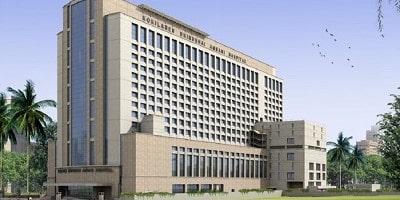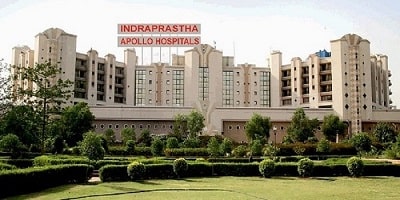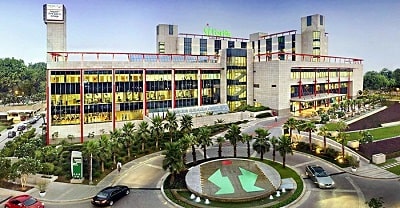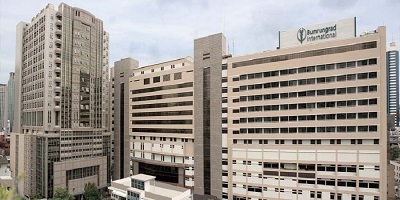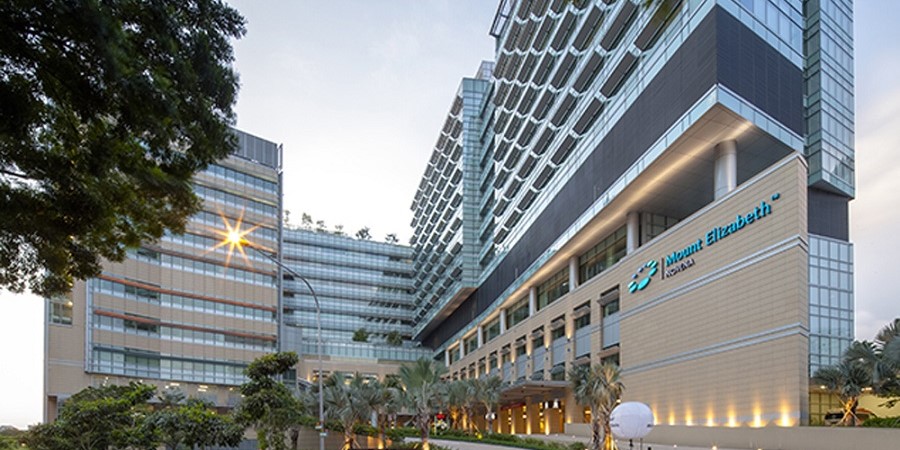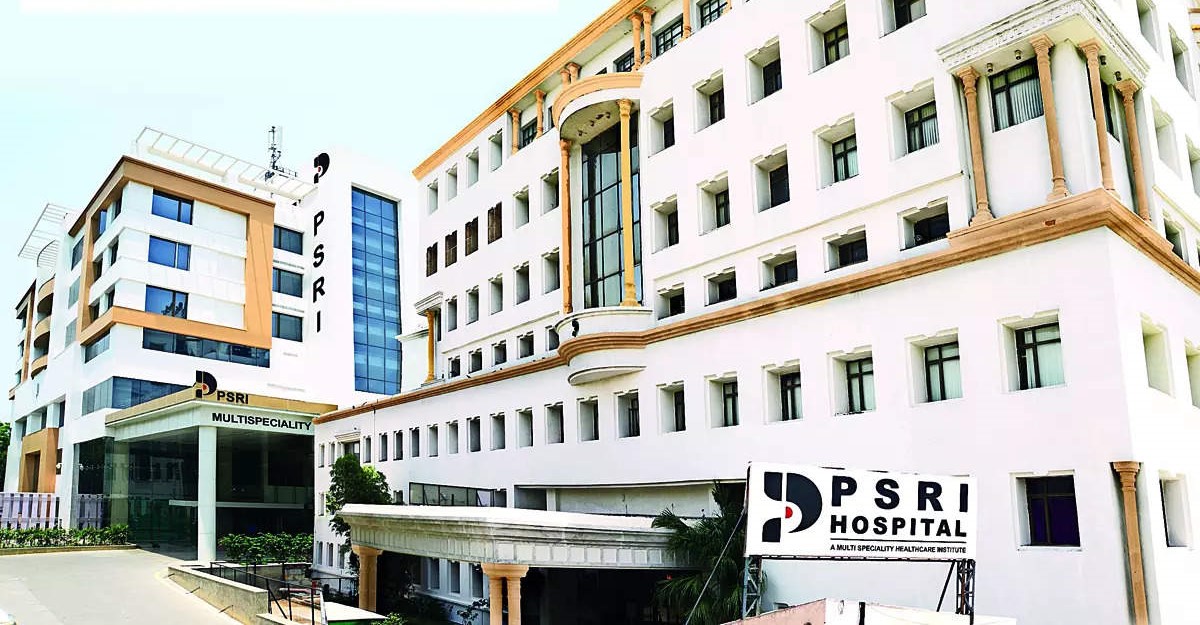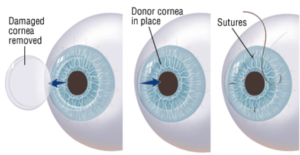
Duration of Treatment
usually takes 1 to 2 hours
Days of Stay
usually daycare procedure in the hospital and 5 days outside the hospital.
Anesthesia
Local anaesthesia or sedative.
Cost
2500 to 3500 USD
Are you looking for Corneal Transplant Cost In India by a topmost Eye Surgeon and Eye hospital in different cities in India? Get free Query by whatsApp/ viber - + 91 9582708782 or email – treatmentquery@gmail.com )
What is a Corneal Transplant?
A cornea transplant is a surgical procedure to replace diseased or scarred cornea with corneal tissue from a donor.
There are two main types of corneal transplants:
- Penetrating keratoplasty:- In which a trephine of appropriate diameter is used to make a full-thickness resection of the patient's cornea.
- Endothelial keratoplasty:- In which Endothelial keratoplasty replaces the patient's endothelium with a transplanted disc of posterior stroma/Descemet/endothelium (DSEK) or Descemet/endothelium (DMEK).
- Lamellar keratoplasty: This is when diseased layers of the cornea are selectively replaced while healthy layers are left in place.
Corneal Transplant Cost in India
The cost of corneal transplant surgery in India can vary significantly based on several factors, including the type of hospital, the city, the specific procedure, the surgeon’s experience, and any additional treatments required. Here are some general estimates: General Cost Estimates:
- Government Hospitals:
- Cost: Typically lower, ranging from 20,000 to 50,000.
- Subsidies: Some government hospitals may offer subsidies or free surgeries under certain health schemes.
- Private Hospitals and Clinics:
- Penetrating Keratoplasty (PK): Costs can range from 50,000 to 1,00,000 per eye.
- Lamellar Keratoplasty (DALK, DSEK, DMEK): Costs can range from 70,000 to 1,50,000 per eye, depending on the complexity and type of lamellar keratoplasty performed.
Factors Influencing the Cost:
- Type of Hospital: Costs are generally higher in private hospitals compared to government hospitals.
- City: Costs may be higher in metropolitan cities like Mumbai, Delhi, Bangalore, and Chennai compared to smaller towns.
- Surgeon’s Expertise: Experienced and renowned surgeons may charge higher fees.
- Complexity of the Case: More complex surgeries or those requiring additional treatments may cost more.
- Donor Tissue: The cost of procuring donor corneal tissue can also impact the overall expense.
- Preoperative and Postoperative Care: Includes consultation fees, diagnostic tests, medications, and follow-up visits, which can add to the overall cost.
Factors Influencing the Cost:
- Type of Hospital: Costs are generally higher in private hospitals compared to government hospitals.
- City: Costs may be higher in metropolitan cities like Mumbai, Delhi, Bangalore, and Chennai than smaller towns.
- Surgeon’s Expertise: Experienced and renowned surgeons may charge higher fees.
- Complexity of the Case: More complex surgeries or those requiring multiple procedures may cost more.
- Preoperative and Postoperative Care: Includes consultation fees, diagnostic tests, medications, and follow-up visits, which can add to the overall cost.
List of Top Best Eye Hospital in India:
- Aravind Eye Hospital: Known for affordable and high-quality eye care services.
- Shankar Netralaya: Renowned for advanced eye care and experienced specialists.
- L V Prasad Eye Institute: Offers comprehensive eye care, including squint surgery.
- Apollo Hospitals: Provides a range of eye care services, including specialized squint surgery.
- Dr. Agarwal's Eye Hospital: Known for modern eye care technology and skilled surgeons.
- Shroff Eye Centre: Renowned for advanced eye care and experienced specialists.
- Sharp Eye Hospital: Provides a range of eye care services, including specialized squint surgery.
- EYE 7 Hospital: The best Eye Hospital in Delhi, India and offers affordable eye care.
- Center for Sight: Centre for Sight Eye Institute, Dwarka, is the largest private comprehensive super speciality eye institute in north India, a one-stop solution for eye-related
- Eye Health Clinic: Quality Care With a Personal Touch. Rest assured, at Eye Health Clinic you are in good hands!
Insurance Coverage:
- Many health insurance policies in India cover corneal transplant surgery, which can significantly reduce out-of-pocket expenses. It is advisable to check with your insurance provider about the specific coverage details.
Consultation and Diagnostic Tests:
- Initial consultation fees and diagnostic tests (such as eye exams, corneal topography, and imaging) may cost between 1,000 to 5,000, depending on the hospital and location.
For the most accurate and personalized cost estimate, it's best to contact specific hospitals or eye care centers directly. They can provide detailed information based on individual cases and requirements.
Insurance Coverage:
- Many health insurance policies in India cover squint surgery, which can significantly reduce out-of-pocket expenses. You should check with your insurance provider about the specific coverage details.
Consultation and Diagnostic Tests:
- Initial consultation fees and diagnostic tests (such as eye exams, measurements, and imaging) may cost between 1,000 to 5,000, depending on the hospital and location.
For the most accurate and personalized cost estimate, contacting specific hospitals or eye care centers directly is best. They can provide detailed information based on individual cases and requirements.
Cornea transplant surgery signs include:
- A cornea that bulges outward (keratoconus)
- Fuchs' dystrophy
- Thinning of the cornea
- Cornea scarring, caused by infection or injury
- Clouding of the cornea
- Swelling of the cornea
- Corneal ulcers, including those caused by infection
- Complications caused by previous eye surgery
Cornea transplant risk factor includes:-
- Risks of anesthesia
- Bleeding
- Infection
- Temporary dizziness
- Eye infection
- Increased risk of clouding of the eye's lens (cataract)
- Pressure increase within the eyeball (glaucoma)
- Problems with the stitches used to secure the donor cornea
- Rejection of the donor cornea
- Swelling of the cornea
- To identify the diagnosis doctor advised going for complete evolution - usually, blood investigation, measuring corneal thickness, size donor cornea you need and Infection or inflammation may reduce your chances of a successful cornea transplant.
- Before the operation, you’ll be asked to sign a consent form, which gives the surgeon permission to carry out the treatment.
- The doctor should be informed about any medication that the patient may be taking.
- The patient is admitted to the hospital on the same days before the procedures.
- Thinners medicines may have to stop before 3 days of surgery.
- The Best Corneal Transplant Cost In India starting from 2500 to 3500 USD the cost varies depending upon City, hospitals, Eye surgeon’s qualifications & experience.
Step 1 – Anesthesia: Cornea transplant surgery takes 1 to 2 hours depending upon the procedures by giving local or general anesthesia to relieve pain.
Step 2 – The incision: The surgeon makes a small round piece of your cornea with a cutting instrument called a trephine by using a microscope. And place new cornea (donor) cut to fit, and will sew it in with an ultra-fine thread that remains in place until your eye completely heals.
Step 3 – Closing the incisions: The eye surgeon flaps the skin after the surgery with the help of Sutures that close the skin incisions.
Step 4 –The results: The overall success rate of a corneal transplant is very high using modern eye banking and surgical techniques with the best prognoses for good vision with a greater than 90% chance of a clear graft. Cornea rejection occurs in about 5 to 10 % of corneal transplants.
- The doctor will give complete information about post care of surgery, regarding recovery; proper caring of incisions, taking medications and managing.
- Patients are allowed to wear eye patches and sunglasses to protest eyes for the first week.
- Read books in moderation for the first week.
- Need follow-up after 6 months
The overall success rate of a corneal transplant is very high using modern eye banking and surgical techniques with the best prognoses for good vision with a greater than 90% chance of a clear graft. Cornea rejection occurs in about 5 to 10% of corneal transplants.
- Are you a board-certified eye surgeon in India?
- How many years’ experience of you has in this field?
- How many surgeries are you doing every day?
- Does your hospital certify to perform corneal transplants surgery?
- Am I a good patient for you to this procedure?
- Let me know success rates and how long time will take for recovery?
- What treatment plan do you recommend and Why?
- What are my options if I am not satisfied with the outcome of my treatment surgery?
- How should I prepare for corneal transplants surgery?
- When can I go for normal activities, including exercise?
- Do I have stitches, staples, and/or bandages?
- Do I have a scar or other permanent effects from corneal transplants surgery?
- Do I need to go to another surgery in the future?
- Do I need any follow-up appointments or tests after my surgery?
Top Doctors
Sorry, There is nothing to show!Come back soon.
Top Hospitals
CORNEAL TRANSPLANT COST IN INDIA

Duration of Treatment
usually takes 1 to 2 hours
Days of Stay
usually daycare procedure in the hospital and 5 days outside the hospital.
Anesthesia
Local anaesthesia or sedative.
Cost
2500 to 3500 USD
Are you looking for Corneal Transplant Cost In India by a topmost Eye Surgeon and Eye hospital in different cities in India? Get free Query by whatsApp/ viber - + 91 9582708782 or email – treatmentquery@gmail.com )
What is a Corneal Transplant?
A cornea transplant is a surgical procedure to replace diseased or scarred cornea with corneal tissue from a donor.
There are two main types of corneal transplants:
- Penetrating keratoplasty:- In which a trephine of appropriate diameter is used to make a full-thickness resection of the patient's cornea.
- Endothelial keratoplasty:- In which Endothelial keratoplasty replaces the patient's endothelium with a transplanted disc of posterior stroma/Descemet/endothelium (DSEK) or Descemet/endothelium (DMEK).
- Lamellar keratoplasty: This is when diseased layers of the cornea are selectively replaced while healthy layers are left in place.
Corneal Transplant Cost in India
The cost of corneal transplant surgery in India can vary significantly based on several factors, including the type of hospital, the city, the specific procedure, the surgeon’s experience, and any additional treatments required. Here are some general estimates: General Cost Estimates:
- Government Hospitals:
- Cost: Typically lower, ranging from 20,000 to 50,000.
- Subsidies: Some government hospitals may offer subsidies or free surgeries under certain health schemes.
- Private Hospitals and Clinics:
- Penetrating Keratoplasty (PK): Costs can range from 50,000 to 1,00,000 per eye.
- Lamellar Keratoplasty (DALK, DSEK, DMEK): Costs can range from 70,000 to 1,50,000 per eye, depending on the complexity and type of lamellar keratoplasty performed.
Factors Influencing the Cost:
- Type of Hospital: Costs are generally higher in private hospitals compared to government hospitals.
- City: Costs may be higher in metropolitan cities like Mumbai, Delhi, Bangalore, and Chennai compared to smaller towns.
- Surgeon’s Expertise: Experienced and renowned surgeons may charge higher fees.
- Complexity of the Case: More complex surgeries or those requiring additional treatments may cost more.
- Donor Tissue: The cost of procuring donor corneal tissue can also impact the overall expense.
- Preoperative and Postoperative Care: Includes consultation fees, diagnostic tests, medications, and follow-up visits, which can add to the overall cost.
Factors Influencing the Cost:
- Type of Hospital: Costs are generally higher in private hospitals compared to government hospitals.
- City: Costs may be higher in metropolitan cities like Mumbai, Delhi, Bangalore, and Chennai than smaller towns.
- Surgeon’s Expertise: Experienced and renowned surgeons may charge higher fees.
- Complexity of the Case: More complex surgeries or those requiring multiple procedures may cost more.
- Preoperative and Postoperative Care: Includes consultation fees, diagnostic tests, medications, and follow-up visits, which can add to the overall cost.
List of Top Best Eye Hospital in India:
- Aravind Eye Hospital: Known for affordable and high-quality eye care services.
- Shankar Netralaya: Renowned for advanced eye care and experienced specialists.
- L V Prasad Eye Institute: Offers comprehensive eye care, including squint surgery.
- Apollo Hospitals: Provides a range of eye care services, including specialized squint surgery.
- Dr. Agarwal's Eye Hospital: Known for modern eye care technology and skilled surgeons.
- Shroff Eye Centre: Renowned for advanced eye care and experienced specialists.
- Sharp Eye Hospital: Provides a range of eye care services, including specialized squint surgery.
- EYE 7 Hospital: The best Eye Hospital in Delhi, India and offers affordable eye care.
- Center for Sight: Centre for Sight Eye Institute, Dwarka, is the largest private comprehensive super speciality eye institute in north India, a one-stop solution for eye-related
- Eye Health Clinic: Quality Care With a Personal Touch. Rest assured, at Eye Health Clinic you are in good hands!
Insurance Coverage:
- Many health insurance policies in India cover corneal transplant surgery, which can significantly reduce out-of-pocket expenses. It is advisable to check with your insurance provider about the specific coverage details.
Consultation and Diagnostic Tests:
- Initial consultation fees and diagnostic tests (such as eye exams, corneal topography, and imaging) may cost between 1,000 to 5,000, depending on the hospital and location.
For the most accurate and personalized cost estimate, it's best to contact specific hospitals or eye care centers directly. They can provide detailed information based on individual cases and requirements.
Insurance Coverage:
- Many health insurance policies in India cover squint surgery, which can significantly reduce out-of-pocket expenses. You should check with your insurance provider about the specific coverage details.
Consultation and Diagnostic Tests:
- Initial consultation fees and diagnostic tests (such as eye exams, measurements, and imaging) may cost between 1,000 to 5,000, depending on the hospital and location.
For the most accurate and personalized cost estimate, contacting specific hospitals or eye care centers directly is best. They can provide detailed information based on individual cases and requirements.
symptoms
Cornea transplant surgery signs include:
- A cornea that bulges outward (keratoconus)
- Fuchs' dystrophy
- Thinning of the cornea
- Cornea scarring, caused by infection or injury
- Clouding of the cornea
- Swelling of the cornea
- Corneal ulcers, including those caused by infection
- Complications caused by previous eye surgery
risk factors
Cornea transplant risk factor includes:-
- Risks of anesthesia
- Bleeding
- Infection
- Temporary dizziness
- Eye infection
- Increased risk of clouding of the eye's lens (cataract)
- Pressure increase within the eyeball (glaucoma)
- Problems with the stitches used to secure the donor cornea
- Rejection of the donor cornea
- Swelling of the cornea
preparation
- To identify the diagnosis doctor advised going for complete evolution - usually, blood investigation, measuring corneal thickness, size donor cornea you need and Infection or inflammation may reduce your chances of a successful cornea transplant.
- Before the operation, you’ll be asked to sign a consent form, which gives the surgeon permission to carry out the treatment.
- The doctor should be informed about any medication that the patient may be taking.
- The patient is admitted to the hospital on the same days before the procedures.
- Thinners medicines may have to stop before 3 days of surgery.
- The Best Corneal Transplant Cost In India starting from 2500 to 3500 USD the cost varies depending upon City, hospitals, Eye surgeon’s qualifications & experience.
procedure
Step 1 – Anesthesia: Cornea transplant surgery takes 1 to 2 hours depending upon the procedures by giving local or general anesthesia to relieve pain.
Step 2 – The incision: The surgeon makes a small round piece of your cornea with a cutting instrument called a trephine by using a microscope. And place new cornea (donor) cut to fit, and will sew it in with an ultra-fine thread that remains in place until your eye completely heals.
Step 3 – Closing the incisions: The eye surgeon flaps the skin after the surgery with the help of Sutures that close the skin incisions.
Step 4 –The results: The overall success rate of a corneal transplant is very high using modern eye banking and surgical techniques with the best prognoses for good vision with a greater than 90% chance of a clear graft. Cornea rejection occurs in about 5 to 10 % of corneal transplants.
post procedure
- The doctor will give complete information about post care of surgery, regarding recovery; proper caring of incisions, taking medications and managing.
- Patients are allowed to wear eye patches and sunglasses to protest eyes for the first week.
- Read books in moderation for the first week.
- Need follow-up after 6 months
success rate
The overall success rate of a corneal transplant is very high using modern eye banking and surgical techniques with the best prognoses for good vision with a greater than 90% chance of a clear graft. Cornea rejection occurs in about 5 to 10% of corneal transplants.
faqs from doctor
- Are you a board-certified eye surgeon in India?
- How many years’ experience of you has in this field?
- How many surgeries are you doing every day?
- Does your hospital certify to perform corneal transplants surgery?
- Am I a good patient for you to this procedure?
- Let me know success rates and how long time will take for recovery?
- What treatment plan do you recommend and Why?
- What are my options if I am not satisfied with the outcome of my treatment surgery?
- How should I prepare for corneal transplants surgery?
- When can I go for normal activities, including exercise?
- Do I have stitches, staples, and/or bandages?
- Do I have a scar or other permanent effects from corneal transplants surgery?
- Do I need to go to another surgery in the future?
- Do I need any follow-up appointments or tests after my surgery?
Top Doctors
Sorry, There is nothing to show!Come back soon.
